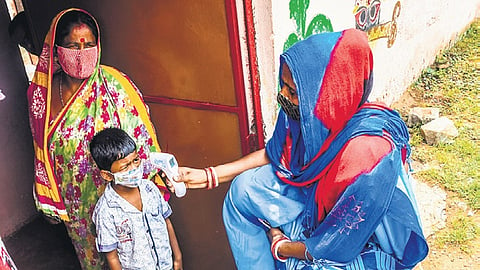

The ASHA or accredited social health activist programme in India is one of the most celebrated community health worker schemes in the world. Launched in 2005,it now has close to 1 million workers and is the backbone of India’s public health infrastructure, particularly in rural areas. Several studies have shown that ASHAs have played a crucial role in improving maternal and child health, increasing immunisation rates, and raising awareness about family planning.
But their reach still needs to include the most under-served sections of the community. We believe this requires interventions that can psychologically empower ASHAs to effectively operate as change agents.
ASHAs’ role is an ‘activist’––going beyond basic healthcare delivery and promoting health awareness, mobilising local community participation in public health planning, and increasing the use of existing services. Bringing about this behaviour change requires significant persuasion, perseverance, and a proactive approach.
However, despite the high expectations, policymakers and formal health staff often attribute a low capacity for independent action to ASHAs, frequently marginalised both socially and economically. This perception manifests in punitive systems and design features that emphasise record-keeping, daily monitoring and performance evaluation focused on compliance rather than outcomes. This system of constant monitoring leads to a ‘check-box’ approach, creating a vicious cycle where they are further pushed into behaviours that undermine their projected capacity for independent action.
As such, these practices treat ASHAs as what economist Julian Le Grand describes in his book, Motivation, Agency, And Public Policy: Of Knights And Knaves, Pawns And Queens, as ‘pawns’.
While offering adequate financial compensation might be one way to enhance their motivation, research indicates this approach often falls short, particularly when it comes to inspiring workers to take on inherently demanding tasks. Such tasks include delivering last-mile services to the most underserved sections of community, which require sustained effort.
Designing financial incentives for these roles is challenging as these efforts are often difficult to measure. In light of these limitations, we argue that the solution lies in psychological theories, particularly those emphasising self-directed action. Such an approach would focus on enhancing intrinsic motivation, enabling ASHAs to take ownership of their roles and perform them with greater autonomy.
One particularly influential framework, the self-determination theory developed by Richard Ryan and Edward Deci (2017), suggests fostering individuals’ capacity for self-directed action depends fundamentally on their experience of choice. This is rooted in the satisfaction of three psychological needs: autonomy, competence, and relatedness.
Autonomy reflects the need to feel ownership over one’s work, competence refers to the need to feel capable in accomplishing tasks, and relatedness represents the need to feel connected to others through one’s work. These intuitive psychological needs have been shown to be strong predictors of intrinsic motivation.
Consider relatedness––a critical yet often overlooked factor in the context of ASHAs. This becomes particularly significant given the social isolation and lack of recognition ASHAs frequently experience. Studies highlight that many ASHAs feel disconnected from both the communities they serve and the formal healthcare system. Enhancing their sense of relatedness could empower ASHAs. Since they are often chosen by the community, it is essential for them to perceive how their efforts directly contribute to positive outcomes for others.
Additionally, recognising that healthcare delivery is a shared mission rather than a solitary responsibility can be psychologically uplifting. This shared purpose fosters a collective sense of accomplishment.
To strengthen this connectedness, one approach could involve creating opportunities for ASHAs to receive direct, meaningful feedback from beneficiaries. This would make their mission more tangible and reinforce the value of their work. Another strategy could include establishing networks where ASHAs can connect, share experiences, and provide mutual support.
Policymakers are increasingly paying attention to capacity building and strengthening support structures. For instance, Madhya Pradesh has adopted a village health mapping system, and Chhattisgarh launched a digital community engagement platform in collaboration with Digital Green.
However, to truly maximise ASHAs’ impact on community health, it is also crucial to think how they can be psychologically empowered. As Le Grand argues, ‘The relationship between the assumptions and realities of human motivation are crucial to the success or otherwise of public policy.’
By fostering autonomy, enhancing competence and nurturing a sense of relatedness, we can create an environment where ASHAs feel valued, motivated, and capable of enacting meaningful change. The future of India’s public health depends not just on the quantity of its workforce, but on the quality of their engagement.
Hence, empowering ASHAs with the tools for self-directed action is not just a policy imperative but a moral one, ensuring those who serve on the frontlines of healthcare are themselves supported and inspired to continue their work.
(Views are personal)
Leena Kinger-Hans
Assistant Professor, organisational behaviour, ISB
Sarang Deo
Professor, operations management, ISB
(With inputs from Pooja Ravikumar, research associate)